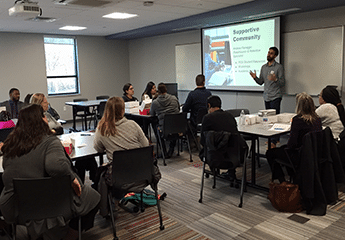After months of debate and research and processing, you’ve decided to make the plunge: you’re going to back to college. Maybe it’s because you want to advance in your job or pursue a new career. Maybe you need to get additional credits to maintain a certification. Or maybe you just want to challenge yourself.
Whatever the reason, you’re probably a bit nervous. A lot may have changed since you walked the halls of academia. When you were in school, bell bottoms may have been all the rage and Lynyrd Skynyrd dominated the airwaves. These days, who knows what’s in style? And all this new technology! Will you be able to understand it?
In this post, we’re going to give you 6 strategies for banishing the fears you have related to returning to school. By the end, you’ll feel confident returning to college, whether virtually or physically.
STRATEGY #1: ADMIT YOU’RE AFRAID
Let’s be honest: one of our prime strategies for fighting fear is pretending we’re not afraid, right? We think that if we bury our fears it somehow makes them not true. The only problem is that this doesn’t work.
Fear is real. It is deeply human to be afraid. In fact, in many ways fears serves a good purpose in our lives. It keeps us from blindly walking into oncoming traffic or deciding it’s fun to wrestle a wild bear. There are physical, chemical aspects of fear as well. Your body goes into fight or flight mode when you’re afraid. You can’t overcome fear if you don’t first admit that it’s there.
And the good news is, confronting your fears is proven to help minimize them. As Psychology Today notes:
…avoiding anxiety maintains and magnifies it. To get rid of your anxiety you should instead capitalize on the principle of habituation through the use of “exposure.” Exposure is by far the most potent medicine known to psychology. It is responsible, directly or indirectly, for most positive improvement achieved in therapy—any therapy, but particularly the treatment of anxiety. Exposure entails facing your fears.
In other words, by exposing your fears, your can become comfortable (“habituated”) with them. You can overcome them.
So what are you afraid of? Write it down. Say it out loud. Don’t try to bury it deep in the recesses of your mind. Once you expose your fear, you can begin conquering it.
STRATEGY #2: CREATE A SUPPORT NETWORK
Overcoming strong fears requires the deep, consistent support of others. If you try to walk a fearful road alone, there’s a good chance you’ll end up overwhelmed or burned out, and possibly be tempted to drop out.
On the other hand, those with a support network of friends and family have the greatest chance of succeeding in school.
And, our need for social support has strong scientific roots. As Scientific American notes:
…new research out of Carnegie Mellon indicates that feeling connected to others, especially through physical touch, protects us from stress-induced sickness. This research adds to a large amount of evidence for the positive influence of social support on health.
There are few things more stressful than returning to school, and having a strong network of those who care for you can greatly reduce that stress.
Take time to talk with your friends and families about returning to school. Let them in on:
- Your initial excitement about all the possibilities.
- The internal conflicts you feel about whether you can actually achieve such a large goal.
- Specific worries (“I’m too old!”).
- Doubts as you see all the roadblocks in front of you and wonder if you can overcome them.
- The resistance to change you feel as you begin to realize that changing your habits, beliefs, and routines might be uncomfortable.
- Your commitment to do whatever work is necessary to achieve your goals.
- When you begin to have confidence and acceptance that you CAN make your goals a reality.
- Etc.
Don’t play the lone ranger tough guy. Enlist the support of others and you’ll have a much better chance of succeeding when you return to school.
STRATEGY #3: PREPARE WELL IN ADVANCE
As Benjamin Franklin said, “Failing to prepare is preparing to fail.” Few things induce panic and anxiety like failing to prepare, and this applies just as much to returning to school.
To achieve the most success with the least stress when returning to school, prepare in advance as much as possible.
Ways to plan include:
- Acquire all textbooks well in advance.
- Familiarize yourself with the campus if you’ll be attending physically.
- Acquaint yourself with the technology if you’ll be getting your education online.
- Communicate with the professor before class starts.
- Read some of the materials in advance if possible.
- Discover what tutoring options are available.
There is significant evidence that preparing in advance can do wonders for stress. Psychologist Robert Epstein conducted a survey of 3,000 people to determine what stress reduction techniques worked best for them. As Time notes:
The stress management technique that worked best, according to the survey: planning. In other words, “fighting stress before it even starts, planning things rather than letting them happen,” says Epstein. “That means planning your day, your year and your life so that stress is minimized.”
Don’t plan to fail. Cut down on your stress by preparing well in advance.
STRATEGY #4: GET A CLEAR VISION OF YOUR GOALS
Fear breeds in uncertainty and ambiguity. On the other hand, when you are absolutely clear about what you want and what you’re going to do to get it, you’re able to conquer your fears. You’re able to say, “What I want is more important than the fears that are currently holding me back.”
Before you go to school, take some time to reflect on your purpose in returning to school. What are you trying to achieve? Why is this so essential to you? Are you setting an example for your children? Are you taking the next steps in your career? Are you finally pursuing something you’ve always dreamed of? Are you finishing something you started long ago?
Setting goals gives clarity and purpose. Bill Copeland said, “The trouble with not having a goal is that you can spend your life running up and down the field and never score.”
Fear can also cause you to run around and never score. Don’t let fear derail you—keep a clear eye on your goals.
STRATEGY #5: GO ONE STEP AT A TIME
This is a corollary to the strategy above. While it’s essential to always keep the end goal in mind, if you try to go more than one step at a time, you can easily become stressed out. Think of it like any big project. When you’re building a house, it can seem like a huge, overwhelming endeavor. But if you break it down into a simple, step-by-step process, it can be done.
The same goes for returning to school. As a whole, the prospect can seem terrifying. It can seem big and vague and confusing and overwhelming. When that happens, figure out the next step. Is the next step to register for classes? Set up your computer? Purchase your textbooks? Do one thing at a time, then move to the next.
By focusing only on the task in front of you, you can avoid the panicky feeling that comes when you try to bite off too much. Plus, there are real scientific benefits to setting and achieving small goals.
It’s possible to manipulate your dopamine levels by setting small goals and then accomplishing them. For instance, your brain may receive a spike in dopamine if you promise yourself that you’ll clean out the refrigerator, and then you do. This is one reason people benefit from to-do lists: The satisfaction of ticking off a small task is linked with a flood of dopamine.
Not only do small goals allow you to make continual progress, achieving them gives you a distinct sense of well being.
STRATEGY #6: MAINTAIN A POSITIVE MINDSET
When facing a new, big challenge, it’s easy to let negative thoughts crowd into your brain.
- I can’t do this.
- This is too hard.
- I’ll be the oldest one.
- I’ll look like a fool.
- I’m not ready for this.
These thoughts are understandable. New experiences like returning to school are often fear-inducing. This is why it’s essential to keep a positive mindset during the process.
This goes far beyond simply thinking happy thoughts. You’re not repeating to yourself, “Don’t worry, be happy.” Rather, it’s about maintaining a positive outlook on life while not pretending that challenges don’t exist. It’s affirming that even though things may be hard, you can and will conquer this challenge. By regularly practicing this type of thinking, you can overcome the constant negative emotions that may crowd your brain.
In addition to helping you overcome fear, positive thinking has very distinct health benefits. As the Harvard Gazette noted:
The most optimistic women (the top quartile) had a nearly 30 percent lower risk of dying from any of the diseases analyzed in the study compared with the least optimistic (the bottom quartile), the study found. The most optimistic women had a 16 percent lower risk of dying from cancer; 38 percent lower risk of dying from heart disease; 39 percent lower risk of dying from stroke; 38 percent lower risk of dying from respiratory disease; and 52 percent lower risk of dying from infection.
Clearly, there is something to maintaining a positive mindset.
Resources to help you thrive
Will returning to school be a challenge? Absolutely.
But don’t let your fear of these things prevent you from succeeding. You are about to embark on something great, something that will pay big dividends in your future.
And the reality is, most of your fears won’t even materialize. As Mark Twain said, “I am an old man and have known a great many troubles, but most of them never happened.”
Cornerstone University offers academic support services to help ease your fears of returning back to school. Our resources like online, 24/7 tutoring, library services and workshops are here to support you and help you to prepare, keep to your goals, take one step at a time and maintain that positive mindset.










